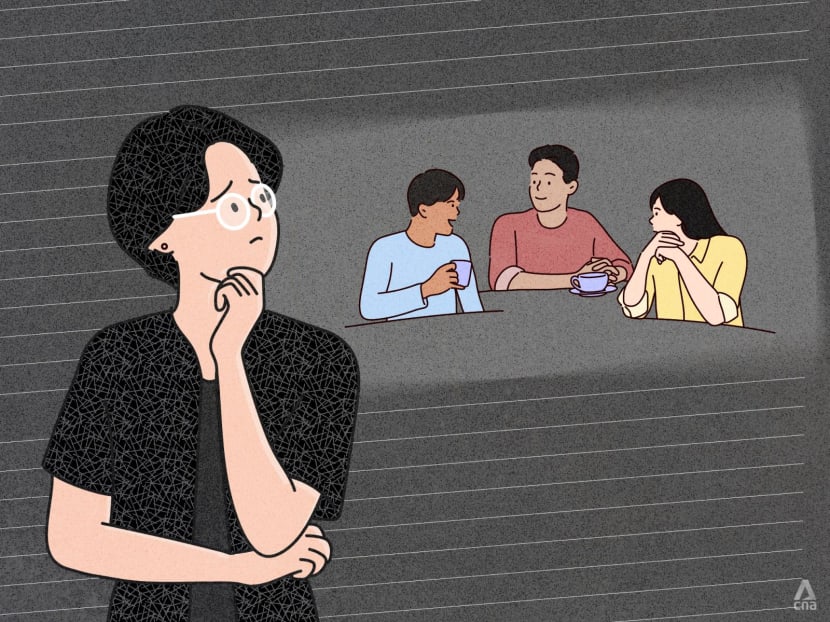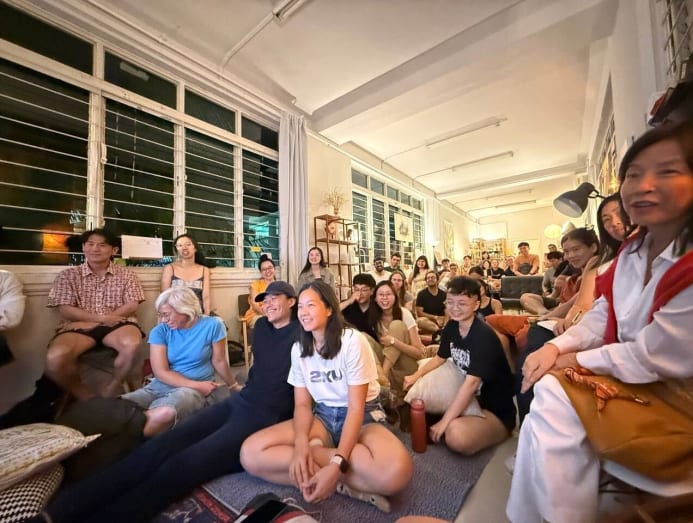Having always struggled to make friends at school or work, this is how I started seeking out real connections on my own
CNA TODAY’s Eunice Sng used to just go with the flow when it came to befriending others, but she realised that casual friendships often do not last.

Throughout Ms Eunice Sng's schooling years, her peers always seemed to be able to interact easily with each other and she felt she was socially inept when she could not do the same. (Illustration: CNA/Samuel Woo)

This audio is generated by an AI tool.
I had few friends while growing up. Throughout my schooling years, I felt like an outsider whenever my peers on campus talked animatedly about football or their favourite K-pop idols.
I didn’t particularly enjoy any of the same activities or interests, so I didn’t really know how to have extended conversations with them.
Watching my peers interact easily with each other, I always figured I was socially inept. “Something must be wrong with me,” I thought. For years, loneliness was a constant shadow looming over me.
I did grow more comfortable spending time by myself over the years. Eventually, I even found that it was much better to enjoy things alone rather than force myself to be with people whose company I didn’t necessarily enjoy.
However, I still craved close friendships, people with whom I could have fun and share my innermost thoughts.
The anxiety started intensifying again when I left my teenage years behind. Once again, I saw that former schoolmates continued to keep in touch with each other, hanging out and travelling together and even celebrating their “friendiversaries” on Instagram.
In university, I tried harder to talk to my coursemates. Every time, our conversations usually revolved around homework, examinations or worries about job-hunting. Once the classes we took together ended, so did the motivation to see one another again.
It felt like the friendships I had were born simply out of convenience and proximity. I was just going along with the flow, passively interacting in environments where I’d been placed rather than making conscious decisions to take charge of my social life.
THE TURNING POINT
Here in Singapore, we spend so much of our waking lives at school or work. The Ministry of Manpower estimated that we spent an average of 43.3 hours working a week.
As a student, I typically spent just as long in school or on homework or studying, if not more.
It can be isolating when we struggle to find people on our wavelength in these structured social settings.
Nearing graduation, it became clear to me that the relationships I had with most of my coursemates wouldn’t survive once we diverged on our own separate paths. Most of them had already formed their own cliques; trying to insert myself into these groups felt unrealistic and a bit rude.
It dawned on me then that instead of whining about being excluded or left out, perhaps I needed to stop waiting for others to ask me out. I needed to seek out my own social spaces and experiences or I would simply be stuck at home alone, with no one to blame but myself.
I started aggressively and actively looking for things that I liked to do. I spent a lot of time browsing social media and online forums and found communities that shared my interests, from gothic fashion groups to Singaporean literature lovers to punk rock music fans.
Many of these communities have Telegram channels where they post events that invite everyone to join. I didn’t know anyone in these groups, but I pushed myself to go alone and speak to new people I typically wouldn’t encounter in school or in the workplace.
I also downloaded a dating application that provided the option of making new platonic connections.
SETTING THINGS IN MOTION FOR MYSELF
The smoking corner of a party venue, in between music sets at a rock concert, between bookshelves after a poetry recital – once I started making an effort to place myself in all these different environments by choice, strangers began striking up conversations without me even trying.
“Your hair is really cool! Who is your hairstylist?” they’d say with a smile. I would compliment them back and ask how often they attended such events and what their hobbies were.
We’d laugh, vow to see each other again and stay in contact through Instagram.
Sometimes we would bump into each other at similar gatherings, or text each other to set up more intentional lunch or dinner dates. One of them even offered to help me with a themed photoshoot that I had been wanting to do for a while.
After some time, I realised that I was far from socially awkward.
I wasn’t bad at making new friends. I just needed to try harder to find the right people, in the right environments. For me, this meant people who shared similar interests and could talk extensively about topics that matter a lot more to me.

I also discovered that I was much more comfortable conversing with people one-on-one rather than in big groups. Because what I value most is listening to their deepest emotions, thoughts and personal values.
This was much likelier to happen in smaller, more intimate settings rather than in larger groups, which is the general format for socialisation that schools tend to promote through orientation camps, class sizes and co-curricular activities.
PRIORITISE MEANINGFUL CONNECTIONS
My social life is still not as vibrant as I would like it to be. I’m still in the process of building a network of friends I can consistently hang out with and confide in them.
Sometimes, I’d strike up a good conversation with someone at an interest-group meeting or activity, but the connection wouldn’t last beyond that day. Yet, I still find such fleeting connections more meaningful than many of the friendships I previously formed in school, simply because it was one that I actively sought.
I wasn’t obliged or “instructed” to get along with them, neither by some higher authority nor by circumstance – I was just genuinely interested in them as people.
For now, I plan to continue attending a diverse range of events in my spare time, focusing on gaining new experiences and forming authentic connections in person.
I also aim to maintain more of these new friendships by showing more interest in their lives and checking in with them regularly, either to catch up over text messages or a meal.
Once a stronger friendship is established, I also intend to ask them if they’d like to try other activities and experiences together – perhaps even outside of the interest or hobby that originally connected us.
MAKE YOUR OWN EFFORT
Granted, I’m only 24 years old, so perhaps it can be argued that it’s somewhat “easier” for me to make big changes in my social life. However, it’s never too late to find your tribe.
Even if you don’t have good friendships cultivated from earlier years, or if your close connections have softened or soured, the average life expectancy in Singapore is 83.5 years, so whether you’re 10, 20 or 30 years older than me, you likely still have decades to seek out people with whom you want to form strong bonds.
In a country of six million people, there are plenty of individuals with unique stories to uncover and from whom you can find inspiration.
If you’re not sure where to start, community organisations such as Stranger Conversations and Friendzone offer safe spaces to form new connections through varied activities.
If you find it too daunting or tiring to put in the effort to look for people you can vibe with, why not let someone else do it for you? Organisers such as Timeleft match you with people they think you might enjoy talking to based on a personalised questionnaire, then arrange for such curated groups to meet at the same place and time.
And if one thing doesn’t suit you, find something else and try again. After all, friendships, with all their ups and downs, are a journey. What matters most is to keep going.
Eunice Sng is a journalist at CNA TODAY.
If you have an experience to share or know someone who wishes to contribute to this series, write to voices [at] mediacorp.com.sg (voices[at]mediacorp[dot]com[dot]sg) with your full name, address and phone number.













